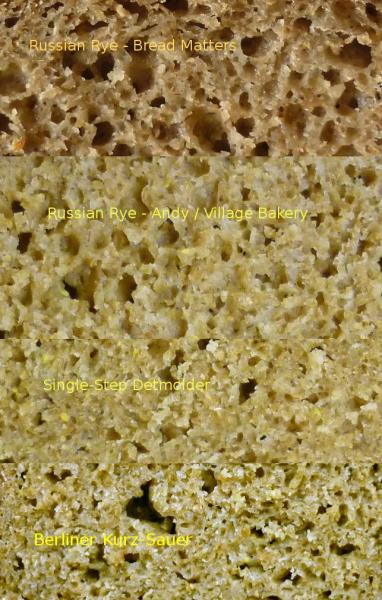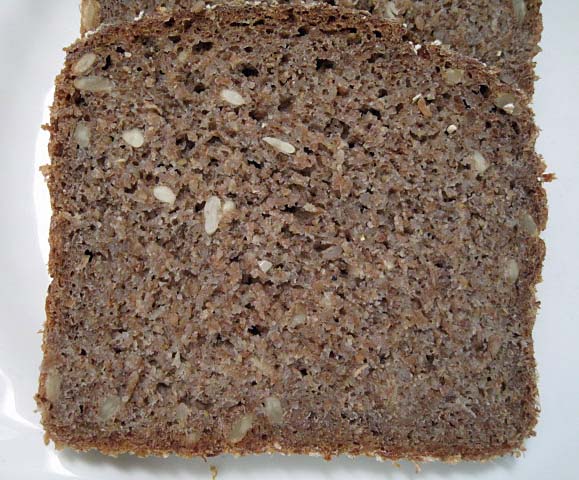Hi,
A little while ago Varda posted about her experiences with the Russian Rye from Andrew Whitley's Bread Matters, and there was a longish discussion of the formula.
I posted some photos of the process of making Russian Rye
Andy suggested to use the formula he remembers from his time with Andrew Whitley at the Village Bakery, and I had a closer look at a couple of German standard formulas.
At the end I baked 4 variations -
Russian Rye, Bread Matters version (100% Hydration, preferment 200% hydration, 31% flour from preferment)
Russian Rye, Andy's version (85% Hydration, preferment 167% hydration, 35% flour from preferment)
Single Step Detmolder (78% Hydration, preferment 80% hydration, 35% flour from preferment)
Berliner Kurz-Sauer (79% Hydration, preferment 100% hydration (fermented at 35C for 3.5 hours) , 50% flour from preferment)
Here a comparison of the crumb (pictures of the loaves can be found in the blogs referenced avove):

Formulas:
1. Russian Rye, Bread Matters Version
| Sourdough | | |
| Rye | 31% | 166g |
| Water | 62% | 333g |
| Mature Starter | 10% | 54g |
| | | |
| Paste | | |
| Rye | 69% | 370g |
| Water | 42% | 225g |
| Salt | 1.50% | 8g |
| Sourdough | 93% | 499g |
| Yield | 206% | 1106g |
The surdough fermented for 14 hours at 24C, the paste is mixed and shaped with wet hands and is put directly into a buttered tin. (2X500g tins in my case)
After 2 hours the loaves were risen by about 25% and bubbles started to show, they were ready for the oven.
The bake: 10 minutes at 240C with steam, then 10 minutes at 225C, then 20 more minutes at 200C.
This bread neads a long rest before cutting, at least 24 hours. In my experience the taste is fully there after 3 days.
The crumb is moist and airy, and the bread has a light tang that gets stronger in time.
2. Russian Rye, Andy's Village Bakery version
| Sourdough | | |
| Rye | 35% | 206g |
| Water | 58% | 341g |
| Mature Starter | 10% | 58g |
| | | |
| Paste | | |
| Rye | 65% | 382g |
| Water | 27% | 159g |
| Salt | 2.00% | 11.7g |
| Sourdough | 93% | 547g |
| Yield | 187% | 1100g |
The process is pretty much the same as above.
The surdough fermented for 14 hours at 24C, the paste is mixed and shaped with wet hands and is put directly into a buttered tin. (2X500g tins in my case) This dough is much easier to handle than (1)
After 2 hours the loaves were risen by about 25% and bubbles started to show, they were ready for the oven.
The bake: 10 minutes at 240C with steam, then 10 minutes at 225C, then 20 more minutes at 200C.
This bread neads less rest before cutting than (1), but at least 24 hours.
The crumb is moist and still light, and the bread has a more rye-y taste than (1).
It is difficult to say which one I prefer, but the handling qualities make this one a better candidate for a production environment.
3. Single-Step Detmolder
This method uses a rye starter with typically 80% hydration which is kept at 24C to 28C for 12 hours. The mature starter can then be used in production for up to 6 hours, it doesn't starve quickly and is very robust.
I followed the formula from an earlier post of mine, using 100% rye.
| Sourdough | | |
| Rye | 35% | 213g |
| Water | 28% | 170g |
| Mature Starter | 6% | 36g |
| | | |
| Paste | | |
| Rye | 65% | 395g |
| Water | 50% | 304g |
| Salt | 2.00% | 12.1g |
| Yeast (fresh) | 1.00% | 6g |
| Sourdough | 63% | 383g |
| Yield | 181% | 1100g |
After mixing the paste ferments for 40min (80min without yeast), is shaped with wet hands and put in tins, and rests for another hour.
Baking as above.
The crumb is quite dense as compared with the othe two breads, and there is a distinctive tang.
4. Berliner Kurz-Sauer
This one is a bit unusual: The sourdough matures at high temperature (35C) inb a very short (kurz) time: 3.5 hours.
At this stage the sourdough is almost frothy, very light and fragile, and tastes fruity mild-sour. The aim is to have a lot of LAB producing lactic acid. Therefore this one relyes a bit more on added yeast for the lift.
| Sourdough | | |
| Rye | 50% | 275g |
| Water | 50% | 275g |
| Mature Starter | 10% | 55g |
| | | |
| Paste | | |
| Rye | 50% | 275g |
| Water | 29% | 159g |
| Salt | 2.00% | 11g |
| Yeast (fresh) | 1.00% | 5g |
| Sourdough | 100% | 550g |
| Yield | 182% | 1100g |
After mixing the paste proofed for about 1 hour, is then shaped with wet hands and put in tins.
At my ambient temperature (24C) the bread was ready for the oven after 2 hours of rest.
The crumb is clearly dryer than the other three breads, and after 24 hours the taste is quite bland.
But I like how this bread developed over time - I had the last bits yesterday - 7 days after the bake. The taste was still mild, with a well developed rye note.
Conclusion:
These four breads are a bit like four different characters. And it's hard for me to say which one I would prefer.
Each of them change their character considerably over time.
If I would need some bread tomorrow I'd go with Andy's Russian or the Detmolder, they have a lot of complexity early on.
The Detmolder was the most sour of the four, and developed even more sourness over time.
The Berliner Kurz-Sour might be a good way to introduce people to this kind of bread due to its mildness, and it also goes well with more delicate toppings.
And the "Bread Matters" Russian has this amazing open texture.
The choice is really up to you.
Juergen








